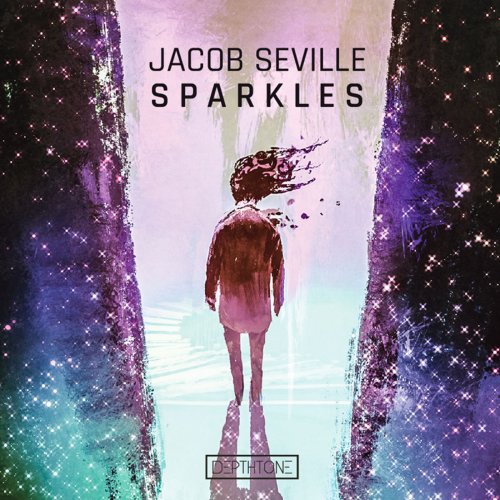
Jacob Seville - Sparkles (2017)
BAND/ARTIST: Jacob Seville
- Title: Sparkles
- Year Of Release: 2017
- Label: Depthtone
- Genre: Electronic, Techno, House
- Quality: 320 Kbps
- Total Time: 78:05 min
- Total Size: 183 MB
- WebSite: Album Preview
Tracklist:
01. Contact
02. Kometa
03. Sparkles
04. In And Out
05. Lost In Space
06. Milkyway
07. Solar System
08. Sunlights
09. Fractals
10. What’s Done Is Done
01. Contact
02. Kometa
03. Sparkles
04. In And Out
05. Lost In Space
06. Milkyway
07. Solar System
08. Sunlights
09. Fractals
10. What’s Done Is Done
The latest Jacob Seville’s album is a lonely odyssey of an artist in the universe of electronic music. Some- where on the horizon you can hear the echoes of past planet - nostalgic progressive house and cool ambi- ent, but Seville is already drifting towards minimal techno space.
The sound of the tracks arouses apocalyptic connotations. The album’s atmosphere annunciates a meta- phorical annihilation, like the inevitable collision of the Earth with a celestial body from the movie "Melan- cholia" from von Trier. Melodic lines are interwoven with the sounds of the cosmos - the singing of Saturn's rings, crackling radio noises of astronauts trying to contact the Earth, whistling Perseids shower.
Jacob Seville equipped his studio with "top- ight" toys to fully capture this unique atmosphere. The wail- ing melody of the "Kometa" track perfectly evokes the picture of a falling star. Every sound, even a single one, has a symbolic meaning. Maybe it’s a white dwarf just approaching the end of his existence? Even the sound of emptiness between the songs resonates and creates a unique musical astronomy.
This is still a dance electronic music but veiled by a kind of nostalgia, uncertainty and fear. Space lacks a foothold. Objects subjected to gravity are orbiting in the depths of the unknown. Sounds are getting closer to each other and then move away, come together in dialogue only to disappear, disintegrate or get lost in the chaos ("Lost in Space")."Sparkles" is also a trip to the sources of electronics and its pioneers. It’s not di cult to nd references to the works of Jean Michel Jarre and Kraftwerk. The retro-style of the track doesn’t take away its modernity. Jacob Seville precisely balances between the two spaces.
The album ends with "What's done is done," the title referring to a quotation from "Macbeth" - the only song whose title escapes from the astronomical nomenclature. Harmonious glissandos whisks in a cosmic wind noise. The bit unexpectedly breaks. Does it fall into a black hole? Maybe you can still hear it but in a di erent space? Several seconds of silence after listening to the whole album don’t give any answers but rather raise trillion questions. Where did we come from? Where are we heading? And are we here alone?
The sound of the tracks arouses apocalyptic connotations. The album’s atmosphere annunciates a meta- phorical annihilation, like the inevitable collision of the Earth with a celestial body from the movie "Melan- cholia" from von Trier. Melodic lines are interwoven with the sounds of the cosmos - the singing of Saturn's rings, crackling radio noises of astronauts trying to contact the Earth, whistling Perseids shower.
Jacob Seville equipped his studio with "top- ight" toys to fully capture this unique atmosphere. The wail- ing melody of the "Kometa" track perfectly evokes the picture of a falling star. Every sound, even a single one, has a symbolic meaning. Maybe it’s a white dwarf just approaching the end of his existence? Even the sound of emptiness between the songs resonates and creates a unique musical astronomy.
This is still a dance electronic music but veiled by a kind of nostalgia, uncertainty and fear. Space lacks a foothold. Objects subjected to gravity are orbiting in the depths of the unknown. Sounds are getting closer to each other and then move away, come together in dialogue only to disappear, disintegrate or get lost in the chaos ("Lost in Space")."Sparkles" is also a trip to the sources of electronics and its pioneers. It’s not di cult to nd references to the works of Jean Michel Jarre and Kraftwerk. The retro-style of the track doesn’t take away its modernity. Jacob Seville precisely balances between the two spaces.
The album ends with "What's done is done," the title referring to a quotation from "Macbeth" - the only song whose title escapes from the astronomical nomenclature. Harmonious glissandos whisks in a cosmic wind noise. The bit unexpectedly breaks. Does it fall into a black hole? Maybe you can still hear it but in a di erent space? Several seconds of silence after listening to the whole album don’t give any answers but rather raise trillion questions. Where did we come from? Where are we heading? And are we here alone?
Year 2017 | Electronic | House | Techno | Mp3
As a ISRA.CLOUD's PREMIUM member you will have the following benefits:
- Unlimited high speed downloads
- Download directly without waiting time
- Unlimited parallel downloads
- Support for download accelerators
- No advertising
- Resume broken downloads


